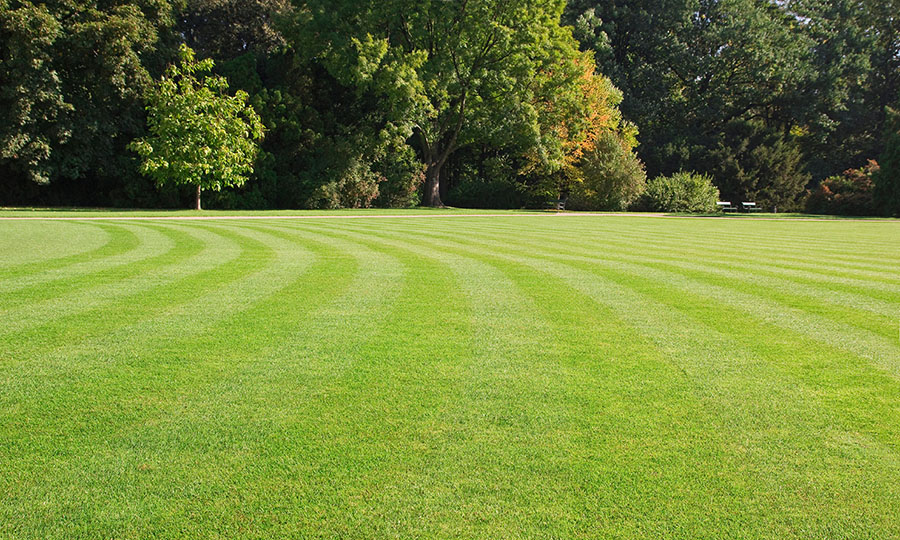BOONE—The continued quest for the perfect lawn contributes to global warming.
Dr. Chuanhui Gu, an assistant professor in Appalachian State University’s Department of Geology, is the lead author of a paper published in the January issue of Journal of Environmental Management that indicates lawns and turf grass systems produce more greenhouse gases than they absorb.
The paper documents research conducted by Gu, Professor George Hornberger and Ph.D. candidate John Crane from Vanderbilt University, and Assistant Professor Amanda Carrico from the University of Colorado-Boulder that analyzed greenhouse gas emissions from lawns and how lawn management practices such as mowing, fertilizing and watering of urban lawns contribute to global warming. Hornberger was the principle investigator of the National Science Foundation funded research.
Although it seems counterintuitive, they found that instead of acting as a carbon sink and storing carbon in the soil as previous studies indicated, lawns and other turf grass systems emit nitrous oxide (N2O), “one of the most problematic greenhouse gases,” Gu said.
Gu said that the impact of one gram of N2O on warming the atmosphere is more than 298 times that of one gram of CO2. The majority of N2O emissions arise naturally from soil, where microbes break down nitrogen from fertilizers, releasing N2O as a byproduct.
“This is an important finding. It raises a red flag and shows that green space is not really green,” he said regarding the notion that urban lawns were beneficial to the atmosphere.
Gu’s colleagues at Vanderbilt spent 16 months collecting N2O emissions from six lawns in residential neighborhoods in Nashville, Tennessee. They used a closed chamber to trap the emissions from the soil and analyzed the air through gas chromatography.
In the continental U.S., urban lawns, including athletic fields and golf courses, account for about 1.9 percent of the total land area, a number that is expected to increase in the future.
Researchers converted the N2O emissions to the CO2 equivalent and included other CO2-equivalent emissions from lawn management practices determined by a survey of 348 households conducted by Carrico. This included the CO2 emissions from the fossil fuel used to mow, irrigate and fertilize lawns, and to manufacture, commercialize and transport fertilizer.
“Based on this land area and other CO2-equivalent emissions from lawn management, the total CO2 emission from lawns in the U.S. is about 25 million tons annually,” Gu said.
“If you take into account the carbon footprint or carbon cost for lawn care practices and the N2O emissions, urban lawns are a net carbon emitter and worsen global warming,” Gu said.
The researchers propose some solutions or best management practices that can be adopted to reduce greenhouse gas emissions.
“As a general rule, the less management the better – less frequent mowing, fertilizer application and irrigation. Also, it’s a better practice to leave the grass clippings to add nutrients to the lawn rather than disposing them at a landfill where they will emit CO2,” Gu said.
“But people care about the aesthetic condition of their lawn. You can’t have an ugly lawn or your neighbor is going to complain,” Gu said. “So we have to find a balance. We can’t completely remove lawn maintenance, but we can educate the community in terms of raising their awareness regarding best lawn management practices.”
About Appalachian State University
As a premier public institution, Appalachian State University prepares students to lead purposeful lives. App State is one of 17 campuses in the University of North Carolina System, with a national reputation for innovative teaching and opening access to a high-quality, cost-effective education. The university enrolls more than 21,000 students, has a low student-to-faculty ratio and offers more than 150 undergraduate and 80 graduate majors at its Boone and Hickory campuses and through App State Online. Learn more at https://www.appstate.edu.
What do you think?
Share your feedback on this story.

![The Search for Vertical Grasslands [alumni featured]](/_images/_posts/2026/03/vertical-grasslands-600x400.jpg)




![How NCInnovation Is Rethinking Economic Development in North Carolina [faculty featured]](/_images/_posts/2026/02/rethinking-economic-development-600x400.jpg)





